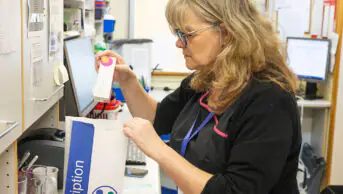
Shutterstock.com
The common ailments service (CAS) in Wales recorded 420,951 consultations over the past 12 months, the Welsh government has said.
In a statement published on 21 January 2025, the Welsh government said the CAS is now available in 99% of pharmacies across Wales and has recorded nearly 1.25 million consultations since it was launched in 2013.
“Last year, more than 400,000 people used the service”, the statement said, with the government later confirming to The Pharmaceutical Journal on 22 January 2025 that 420,951 consultations had been recorded in that time.
The CAS provides access to free, confidential advice and treatments for 28 common illnesses, including sore throats and urinary tract infections. Many pharmacies also offer access to emergency contraception, as well as annual flu vaccinations and regular contraception services.
“There are also around 220 pharmacies delivering the pharmacist independent prescribing service — equivalent to a third of all pharmacies in Wales,” the statement said, adding that this enables pharmacists to treat a range of conditions such as ear, skin and respiratory infections, sinusitis and migraine.
Use of the CAS has grown among patients since 2018/2019, when pharmacies recorded 43,379 consultations, according to StatsWales.
Between April 2023 and March 2024, StatsWales recorded 344,376 CAS consultations, an increase of 44.1% from 2022/2023 when 239,032 consultations were recorded. In 2023/2024, the most common reason for accessing the CAS was conjunctivitis with 51,475 consultations, followed by hay fever with more than 48,356 consultations.
More than half (50.9%) of all consultations were for four conditions: conjunctivitis (15%), hay fever (14%), sore throat and tonsilitis (11.6%) and dry skin/dermatitis (10.3%).
There were also more consultations in 2023/2024 than in 2022/2023 for all conditions apart from chicken pox, which decreased by 7.7%. The largest percentage increases were for scabies (157.9%), colic (100%) and back pain (96.5%).
Commenting on the data, Gwawr Davies-Jones, a pharmacist at High Street Pharmacy in Barry, Wales, said: “Instead of being in the dispensary, we are now in the consultation room for the most part of the day, offering clinical services. On average, we undertake more than 20 consultations every day, ranging from providing contraception to emergency medicine supplies.
“The demand for advice on common conditions in the community is great, providing pharmacists with an opportunity to share advice and treatment with their patients, including prescribing antibiotics and other prescription-only medicines where indicated, without the need to see a GP, freeing up much needed appointments for people with more complex conditions.”
Elen Jones, director for Wales at the Royal Pharmaceutical Society, welcomed the latest data for “highlighting the widespread use of the CAS, which is now firmly established as the public’s first port of call for managing common health issues”.
“We are encouraged by the continued growth of independent prescribing services, reflecting the profession’s progress towards the 2030 goal of all community pharmacies in Wales having a pharmacist prescribing service, as outlined in our 2030 vision for the profession in ‘Pharmacy: delivering a healthier wales‘,” she said.
However, she added that the ongoing success of the CAS “depends on robust support to ensure the sustainability of pharmacy services, manageable workloads and sufficient time for professional development”.
Russell Goodway, chief executive of Community Pharmacy Wales (CPW), said: “CPW has been extremely impressed by the extent that the Wales-based community pharmacy network has engaged with the delivery of the Welsh CAS.
“The success of the network has been beyond expectations and community pharmacy healthcare professionals need to be congratulated on their success in convincing hundreds of thousands of patients to make greater use of their local pharmacy,” he added.
“However, there is a limit on what it can provide within existing funding envelopes, and unless recent cost increases such as the changes to national insurance and the increase in the national living wage are fully funded, it will be impossible for the network to continue to deliver current service levels.”
The Welsh government has confirmed a 6% funding increase as part of the ‘Community pharmacy contractual framework’ for 2024/2025.


